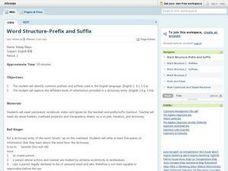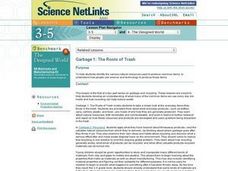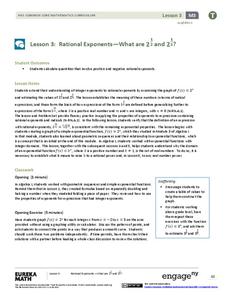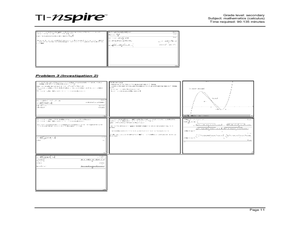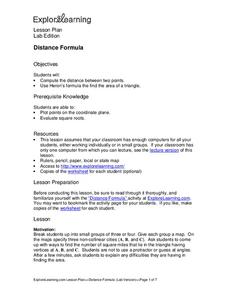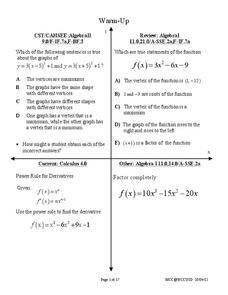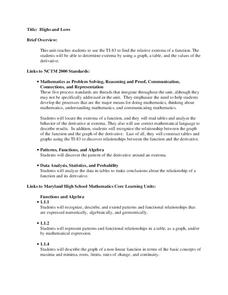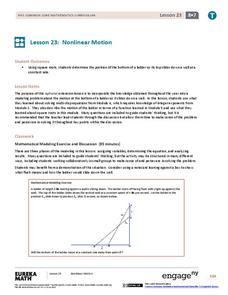EngageNY
The Pythagorean Theorem
Class members explore the estimation of irrational numbers in association with the Pythagorean Theorem. The first instructional activity of this module challenges pupils to use the Pythagorean Theorem to find unknown side lengths. When...
Curated OER
Word Structure-Prefix and Suffix
Young scholars identify the common prefixes and suffixes used in the English language. They dissect a word into its various (root, prefix, suffix) parts and use a dictionary to determine the proper usage and derivation of each word...
Curated OER
GARBAGE 1: THE ROOTS OF TRASH
Students identify the various natural resources used to produce common items; to explain how people use science and technology to produce those items.
Curated OER
Differentiation of Functions
In this differentiation of functions worksheet, students find the first derivative of given functions. Functions contain exponents and square roots. This three page worksheet contains nine multi-step problems.
Curated OER
Calculus Assignment #1: Integrals
In this calculus worksheet, students evaluate given integrals. Problems contain exponents, square roots, and complex fractions. This two-page worksheet contains 16 multi-step problems. Answers are provided on page two.
Curated OER
Calculus Assignment #5: Integrals
In this calculus assignment worksheet, students evaluate given integrals. Problems contain square roots, complex fractions, and exponents. This two-page worksheet contains 14 problems. Answers are provided on page two of the worksheet.
EngageNY
Stretching and Shrinking Graphs of Functions
Why is that graph wider? Pupils learn about stretching and shrinking graphs of square root, absolute value, cubic, and quadratic functions. They study both vertical and horizontal stretches and shrinks in addition to reflections.
EngageNY
Translating Graphs of Functions
If you know one, you know them all! Parent functions all handle translations the same. This lesson examines the quadratic, absolute value, and square root functions. Pupils discover the similarities in the behavior of the graphs when...
EngageNY
Rational Exponents—What are 2^1/2 and 2^1/3?
Are you rooting for your high schoolers to learn about rational exponents? In the third installment of a 35-part module, pupils first learn the meaning of 2^(1/n) by estimating values on the graph of y = 2^x and by using algebraic...
Curated OER
Connection to Language Arts-Hidden Meanings
In this etymology worksheet, students read about the history of naming words and how words are named. They think critically by answering three questions about the meaning of words, etymologies and the derivation of words.
Curated OER
Two Investigations of Cubic Functions
Through learning about cubic functions, students graph cubic functions on their calculator. Students determine the local maximum and minimum points and the tangent line from the x-intercept to a point on the cubic function. Students...
Curated OER
Building a General Quadratic Function
Learners rewrite a general quadratic function by completing the square to see a new form of the function that more easily identifies the x-coordinate of the vertex and the two roots of the function.
Curated OER
Derivational Suffixes Worksheet
In this suffixes worksheet, students learn that derivational suffixes change the meaning of words and the part of speech. Students write the original meaning of six words, add the suffix, and write the new meaning.
EngageNY
Dividing by (x – a) and (x + a)
Patterns in math emerge from seemingly random places. Learners explore the patterns for factoring the sum and differences of perfect roots. Analyzing these patterns helps young mathematicians develop the polynomial identities.
Curated OER
Word Maps Teaching Ideas
In this literacy worksheet, students are given a graphic organizer to complete or are presented it as part of the lesson developed from using this sheet.
Curated OER
Complex Analysis: The Complex Derivative
In this complex derivative worksheet, students determine the circle of a radius under the mapping principle. They identify analytic functions, and explore the relationship between real and imaginary parts of complex functions. This...
Curated OER
Distance Formula
Students create ways to find the number of square miles that lie in a triangle having vertices at A, B, and C. They compute the distance between two points and use Heron's formula to find the area of the triangle. Finally, students...
West Contra Costa Unified School District
Particle Motion
Derivatives are useful for many things — they can even keep track of particle motion. An informative lesson plan provides an introduction to the idea of the second derivative in particle motion. Class members determine the velocity...
Curated OER
Numerical Analysis
In this math worksheet, students practice analyzing root finding algorithms, Newton-Raphson and secant. They use the examples to master the concepts.
Curated OER
Highs and Lows
Solve problems using integration and derivatives. By using calculus, learners will analyze graphs to find the extrema and change in behavior. They then will identify the end behavior using the derivatives. Activities and handouts are...
Curated OER
Greek To Us - Comedy, Tragedy, and Satire
The history of Greek drama is the focus of this multiple-choice quiz. Ten questions ask about historical figures and the roots of tragedy and comedy in Greek religious festivals. While studying Greek drama, use this quiz to test your...
Curated OER
Words with Less Common Derivatives
For this derivatives worksheet, students review the definition of derivatives and then some examples. Students then find a derivative on their own for the word oppose and complete activities for its derivative. Students then find...
EngageNY
Solving Equations with Radicals
Show learners how to develop a procedure for solving equations using radicals with the fifth lesson of the 25-part module that challenges learners to use properties to solve multi-step quadratic and cubic equations. Individuals round out...
EngageNY
Nonlinear Motion
Investigate nonlinear motion through an analysis using the Pythagorean Theorem. Pupils combine their algebraic and geometric skills in the 24th lesson of this 25-part module. Using the Pythagorean Theorem, scholars collect data on the...



